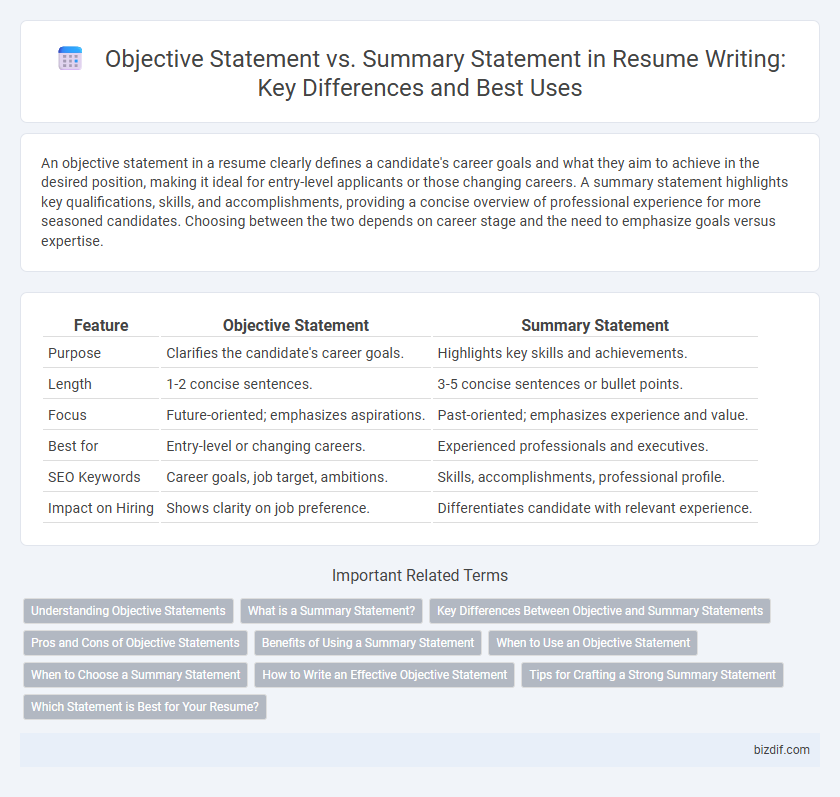An objective statement in a resume clearly defines a candidate's career goals and what they aim to achieve in the desired position, making it ideal for entry-level applicants or those changing careers. A summary statement highlights key qualifications, skills, and accomplishments, providing a concise overview of professional experience for more seasoned candidates. Choosing between the two depends on career stage and the need to emphasize goals versus expertise.
Table of Comparison
| Feature | Objective Statement | Summary Statement |
|---|---|---|
| Purpose | Clarifies the candidate's career goals. | Highlights key skills and achievements. |
| Length | 1-2 concise sentences. | 3-5 concise sentences or bullet points. |
| Focus | Future-oriented; emphasizes aspirations. | Past-oriented; emphasizes experience and value. |
| Best for | Entry-level or changing careers. | Experienced professionals and executives. |
| SEO Keywords | Career goals, job target, ambitions. | Skills, accomplishments, professional profile. |
| Impact on Hiring | Shows clarity on job preference. | Differentiates candidate with relevant experience. |
Understanding Objective Statements
Objective statements in resume writing clearly define a candidate's career goals and the specific position they are seeking, helping employers quickly identify alignment with job requirements. These concise declarations highlight the applicant's intentions and can guide recruiters in evaluating fit for entry-level or transitional roles. Understanding objective statements enables job seekers to tailor their resumes effectively, increasing the chances of securing interviews in competitive job markets.
What is a Summary Statement?
A Summary Statement in a resume is a brief, compelling overview highlighting your key qualifications, skills, and career achievements tailored to the job you're targeting. It serves to captivate hiring managers by quickly communicating your value proposition and how your experience aligns with the position. Unlike an Objective Statement that focuses on career goals, a Summary Statement emphasizes proven results and professional strengths to make a strong first impression.
Key Differences Between Objective and Summary Statements
Objective statements focus on the candidate's career goals and what they hope to achieve in the role, often tailored to entry-level or career-changing applicants. Summary statements highlight key qualifications, skills, and accomplishments, showcasing the candidate's value and expertise to experienced professionals. Choosing between them depends on the applicant's career stage and the employer's preference for goal-oriented versus skill-based introductions.
Pros and Cons of Objective Statements
Objective statements in resumes clearly define a candidate's career goals, providing recruiters with a focused understanding of the applicant's intentions. They benefit entry-level job seekers by highlighting ambition but can be limiting for experienced professionals as they may appear self-centered or vague. Unlike summary statements that showcase skills and achievements, objective statements sometimes lack impact and fail to demonstrate value to employers.
Benefits of Using a Summary Statement
A summary statement offers a concise overview of key skills, achievements, and professional experience, making it easier for recruiters to quickly assess qualifications. Unlike an objective statement that focuses on career goals, a summary highlights proven competencies and value, increasing the chances of passing Applicant Tracking Systems (ATS). This strategic emphasis on accomplishments enhances overall resume effectiveness and boosts the likelihood of securing interviews.
When to Use an Objective Statement
Objective statements best suit entry-level candidates or career changers aiming to clearly state their professional goals and align expectations with potential employers. They help emphasize specific positions or industries targeted and convey immediate value to hiring managers. Use an objective statement when your career direction needs clarification or you want to highlight motivation for a particular role.
When to Choose a Summary Statement
Choose a summary statement when you have extensive professional experience and a diverse skill set that aligns with the job requirements. Summary statements provide a concise overview of your key achievements, expertise, and career highlights, making them ideal for senior-level professionals or those changing industries. This format helps recruiters quickly assess your value and suitability for advanced roles or specialized positions.
How to Write an Effective Objective Statement
An effective objective statement clearly defines your career goals and the specific role you are targeting, making it concise and tailored to the job description. Use precise keywords related to the industry and position to improve semantic relevance and capture the employer's attention quickly. Highlight your key skills and what you aim to contribute, aligning your objectives with the company's needs for maximum impact.
Tips for Crafting a Strong Summary Statement
Focus on tailoring the summary statement to highlight key achievements, relevant skills, and industry-specific keywords that match the job description. Use concise, impactful language to convey your professional value and career goals clearly within 3-4 sentences. Incorporate measurable results and action verbs to create a compelling narrative that grabs recruiters' attention quickly.
Which Statement is Best for Your Resume?
An Objective statement clearly defines career goals and is ideal for entry-level candidates or those changing industries, emphasizing what the applicant seeks. A Summary statement highlights key skills and accomplishments, making it stronger for experienced professionals aiming to showcase relevant expertise. Choosing between them depends on your career stage and the job role, with Summary statements generally preferred for demonstrating value to employers.
Objective statement vs Summary statement Infographic

 bizdif.com
bizdif.com